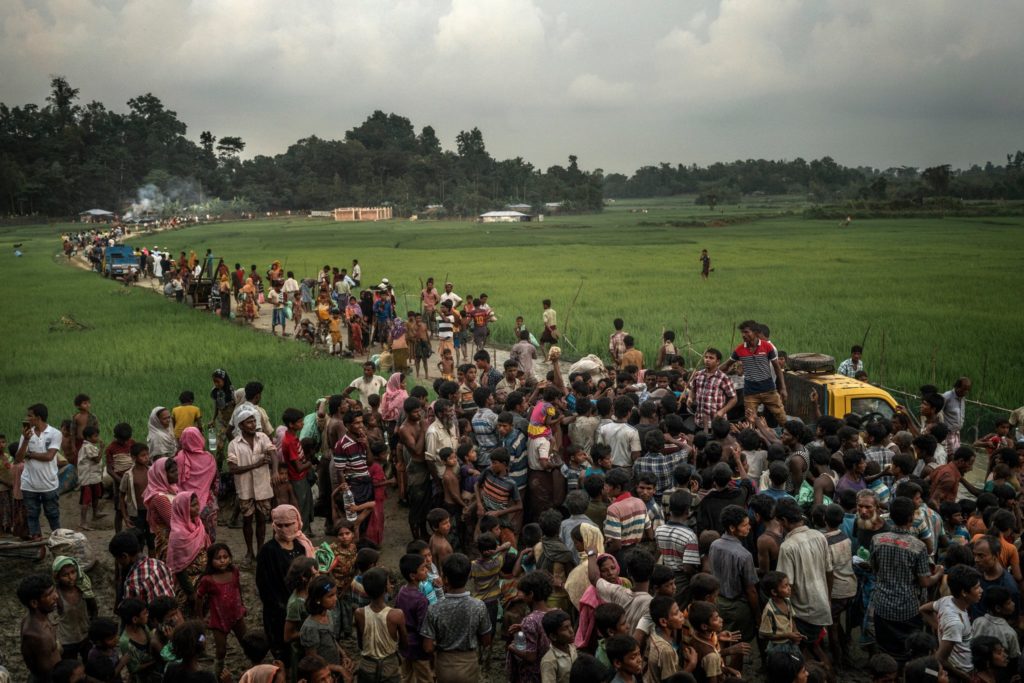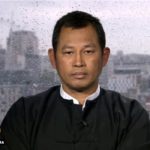Rohingyas Are Survivors, Not Security Threat
TRANSCEND MEMBERS, 18 Dec 2017
Maung Zarni | Prothom Alo – TRANSCEND Media Service
13 Dec 2017 – Can you imagine BBC, Chatham House, Rand Corporation portraying as potential “Jewish terrorists” the survivors of Auschwitz-Birkenau, Ravensbruick, Dachau and other world infamous death and labour camps? Can you imagine young Jewish children and orphans who were rescued through the programme “kindertransport”, being framed by Allied Policy Makers and advisers as “embryonic Jewish terrorists”, who naturally might be seething with the desire for revenge against the Old Europe post-Third Reich, that, with no shame nor conscience, appeased Hitler in exchange for lucrative business deals or anti-USSR intelligence cooperation while millions of Jewish parents were gassed to death?
Of course not!
But that is precisely what is now happening to the survivors of my Buddhist country’s genocide, whose name even the entire Catholic Church in Myanmar, and by extension, Pope Francis, have dared not pronounce, lest saying the victims’ ethnic identity might irritate Myanmar’s genocidal leaders, the likes of General Min Aung Hlaing and Aung San Suu Kyi
One million Rohingyas are suffering from this double-whammy of oppression: a perceived threat at home in North Arakan or Rakhine State of Myanmar, and a projected threat across the borders in Chittagong of Bangladesh.

The line for aid at a refugee camp in Unchiprang, Bangladesh. Credit Adam Dean for The New York Times
The country of their birth – whatever their citizenship status or ethnic identity – falsely, and officially, frames Rohingyas as ‘illegal Bengali migrants’, or worse, ‘communities of Jihadists’. This view has been cultivated and popularized in the Burmese civil society at large, which now behaves more like the Germans in the 1930s’ than the public that is pushing for human rights or democratization.
In the eyes of the Burmese public, Rohingyas are seen as a demographic threat to the ‘Buddhist Way of Life’ and a national security. Accordingly, they are mistreated genocidally on their own soil. The host country of Bangladesh of 166 million Muslims, which opened its eastern borders when the human tsunami of fleeing Rohingyas cried out for refuge, has long-standing concern about the Rohingyas in need, becoming ‘a non-traditional security threat’ (epidemic, prostitution, narcotic trade, etc.), as well as a potential pool of Islamic terrorists.
Joining these sovereign states and their governments in this pathological orgy of mis-framing the world’s largest stateless people, that is, the most vulnerable and persecuted community who have just survived the most unimaginably sadistic, coordinated and widespread terror, are consultants and journalists who make a living pumping out ‘security analyses’ for national governments and government-funded think-tanks.
To my dismay, even the country’s great humanitarian and Nobel Peace Laureate Mohammad Yunus – not to mention the usual national security types – has shown no qualms about expressing his national security concerns for Bangladesh, emanating from the prolonged Rohingya presence. He has recently done this in his interview with Mehdi Hassan on Al Jazeera English and elsewhere.
It is now widely reported that Rohingya orphans, women and young girls – including the survivors of genocidal gangrape by Myanmar troops – have been preyed on by local Bangladesh and Rohingya criminal networks – to be exploited as prostitutes, drug mules, bonded labourers, and so on.
Deeply troubling is the existence of white-collar crimes, which I will call the symbolic exploitation of Rohingyas, whereby researchers, journalists and other professionals make their living selling analyses and reports framed within the discourses of ‘Muslim insurgency’, ‘Islamic radicalization’ and ‘fundamentalist terror’. Their human objects of professional gaze, that is, Rohingya survivors of Myanmar genocide – are potential drug mules, petty criminals and ultimately Jihadists.
Considering that out of the recent arrivals of 640,000 Rohingyas, 60 per cent are deeply emotionally scarred women, traumatized children, frail elderly men and women the broad stroke portrayal of this population as a ‘threat to regional instability’ and potential for ISIS recruits is as despicable as the genocidal acts that drove these people in deep and visible misery.
These white-collar criminals – again think-tank consultants, seasoned journalists, amateur Myanmar experts – are equally, if not more, deadly and immoral as the local pimps and petty criminals in Chittagong. Both groups prey on the most vulnerable of all human to line their pockets, enhance their expert reputations and climb their professional ladders as ‘experts on terrorism’, ‘security’, etc.
Swallowing my deep outrage, I have forced myself to read think-tank reports, newspaper editorials, political discussions and media interviews where politicians, consultants, NGOs and journalists express what they consider the prospects for radicalisation of what Bangladesh refers to, gingerly, as ‘forcibly displaced persons from Myanmar’. These ‘security experts’ blatantly ignore the fact that no Rohingya has blown him- or herself up in either Myanmar or Bangladesh – or for that matter, any world’s capital, in the last 39 years since Myanmar launched its first wave of genocidal terror in North Arakan under the guise of ‘anti-illegal immigration’ campaign.
Alas, calling the one million Rohingya genocide survivors, which is what they in fact are, would, I would hope, compel the world of national governments, mass media and national security agencies to accord Rohingyas the kind of belated political support and moral stature which the Holocaust survivors were deservedly accorded.
Why then do the integrated world of power, intelligence and money go along with the pathetic mis-framing of these human victims of the crime of barbarity in Myanmar?
I offer two brief but interlinked explanations: Islamophobia and the mental culture of paranoia on which intelligence agencies rest.
First, these agencies and men and women who staff them, are, institutionally and temperamentally, conditioned to view any human individuals as potential criminals while normal, healthy minds view other humans as decent, potential friends, lovers, and partners. A dear friend and university classmate of my late father who held a coordinator position in Burma’s National Intelligence Bureau reinforced my view that national security paradigms are anchored in institutionalized paranoia.
Second and finally, since 9/11 the western media and the powerful culture industry such as the Hollywood have helped spread the Orientalist (read racist) portrayal of Muslims and Islam as terroristic, senseless, ruthless, parochial, and reactionary. Never mind that it is “the Christian West” – if we must put the mega-pathos of humans in religious terms – have been the primary factor behind the greatest number of death and destruction on a global scale over the last 100 years. The Two World Wars, the Holocaust, the Cold War of Gulags and Death Squads, the Korean War, the Vietnam, and the presently expanding wars in the Middle East come to mind. That doesn’t even include the 500-years of Church-blessed and/or financed European colonialisms and the resultant colonial genocides across the globe.
It is high time that Rohingya refugees are popularly and officially recognized as survivors of Myanmar genocide, ethnic cleansing, crimes against humanity, or whatever one may choose to call their horrendous experiences.
The last thing these Rohingyas – including over 200,000 children – deserve is to be painted as would be Jihadists and Muslim insurgents. We did not call or treat the Holocaust survivors as potential “Jewish terrorists”. Why should we mis-frame, either out of Islamophobia or Pavlovian-paranoia, the Rohingya survivors as potential “Jihadists” or “Muslim insurgents”? Don’t add insult to the genocidal injury of the world’s most persecuted people whose only crime is that they are Rohingya Muslims.
___________________________________________
 A Buddhist humanist from Burma, Maung Zarni is a member of the TRANSCEND Network for Peace Development Environment, former Visiting Lecturer with Harvard Medical School, specializing in racism and violence in Burma and Sri Lanka, and Non-resident Scholar in Genocide Studies with Documentation Center – Cambodia. His analyses have appeared in leading newspapers including the New York Times, The Guardian and the Times. Among his academic publications on Rohingya genocide are The Slow-Burning Genocide of Myanmar’s Rohingyas (Pacific Rim Law and Policy Journal), An Evolution of Rohingya Persecution in Myanmar: From Strategic Embrace to Genocide, (Middle East Institute, American University), and Myanmar’s State-directed Persecution of Rohingyas and Other Muslims (Brown World Affairs Journal, forthcoming). He holds a PhD (U Wisconsin at Madison) and a MA (U California), and has held various teaching, research and visiting fellowships at the universities in Asia, Europe and USA including Oxford, LSE, UCL Institute of Education) , National-Louis, Malaya, and Brunei. He is the recipient of the “Cultivation of Harmony” award from the Parliament of the World’s Religions (2015).
A Buddhist humanist from Burma, Maung Zarni is a member of the TRANSCEND Network for Peace Development Environment, former Visiting Lecturer with Harvard Medical School, specializing in racism and violence in Burma and Sri Lanka, and Non-resident Scholar in Genocide Studies with Documentation Center – Cambodia. His analyses have appeared in leading newspapers including the New York Times, The Guardian and the Times. Among his academic publications on Rohingya genocide are The Slow-Burning Genocide of Myanmar’s Rohingyas (Pacific Rim Law and Policy Journal), An Evolution of Rohingya Persecution in Myanmar: From Strategic Embrace to Genocide, (Middle East Institute, American University), and Myanmar’s State-directed Persecution of Rohingyas and Other Muslims (Brown World Affairs Journal, forthcoming). He holds a PhD (U Wisconsin at Madison) and a MA (U California), and has held various teaching, research and visiting fellowships at the universities in Asia, Europe and USA including Oxford, LSE, UCL Institute of Education) , National-Louis, Malaya, and Brunei. He is the recipient of the “Cultivation of Harmony” award from the Parliament of the World’s Religions (2015).
Go to Original – prothom-alo.com
DISCLAIMER: The statements, views and opinions expressed in pieces republished here are solely those of the authors and do not necessarily represent those of TMS. In accordance with title 17 U.S.C. section 107, this material is distributed without profit to those who have expressed a prior interest in receiving the included information for research and educational purposes. TMS has no affiliation whatsoever with the originator of this article nor is TMS endorsed or sponsored by the originator. “GO TO ORIGINAL” links are provided as a convenience to our readers and allow for verification of authenticity. However, as originating pages are often updated by their originating host sites, the versions posted may not match the versions our readers view when clicking the “GO TO ORIGINAL” links. This site contains copyrighted material the use of which has not always been specifically authorized by the copyright owner. We are making such material available in our efforts to advance understanding of environmental, political, human rights, economic, democracy, scientific, and social justice issues, etc. We believe this constitutes a ‘fair use’ of any such copyrighted material as provided for in section 107 of the US Copyright Law. In accordance with Title 17 U.S.C. Section 107, the material on this site is distributed without profit to those who have expressed a prior interest in receiving the included information for research and educational purposes. For more information go to: http://www.law.cornell.edu/uscode/17/107.shtml. If you wish to use copyrighted material from this site for purposes of your own that go beyond ‘fair use’, you must obtain permission from the copyright owner.